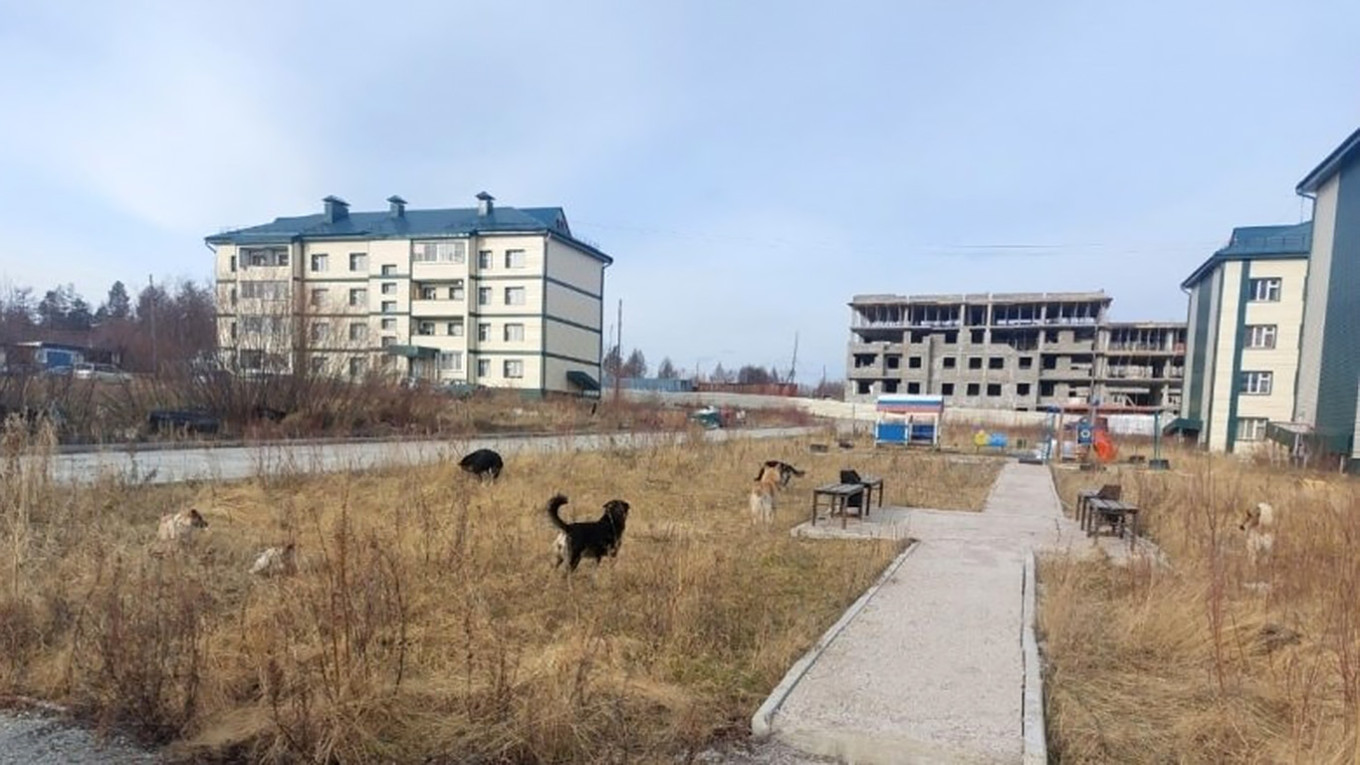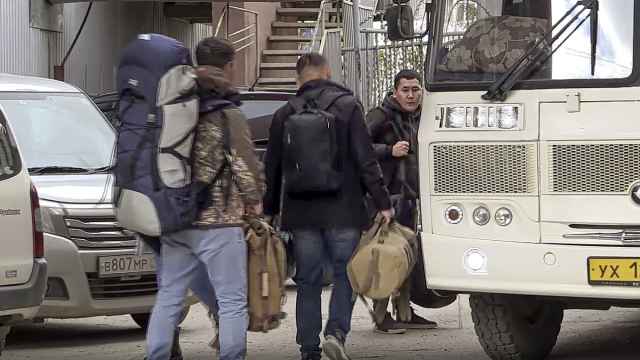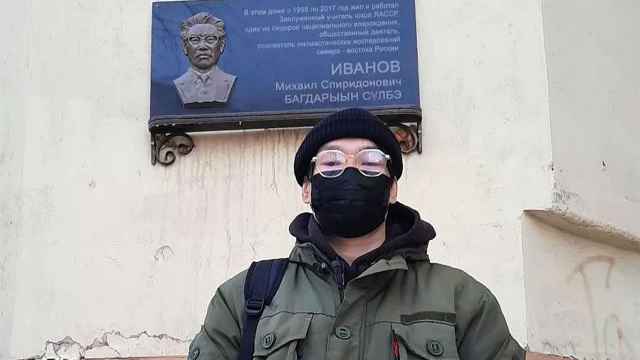Dozens of residents of a small village in Russia’s republic of Sakha (Yakutia) protested against local authorities on Wednesday after a 12-year-old local girl died from injuries sustained in an attack by a pack of stray dogs.
"We came here to demand at least some action,” a local resident who attended the protest told the Sibir.Realii news outlet, adding that local head Stalik Deryagin “hasn’t done sh**” to address residents’ repeated complaints about packs of strays terrorizing the village.
“This is an issue [that has persisted for] several years, not months. Should we take up arms ourselves [to shoot the animals] now? They are forcing us to do this!" he said.
The Wednesday protest did not last long, as a squad of about 20 policemen and security forces officers soon arrived to disperse the crowd, eyewitnesses told Sibir.Realii.
Like other parts of Sakha and other regions of Russia, Chulman, a village of less than 10,000 people some 750 kilometers south of the republic’s capital Yakutsk, has been grappling with a stray dog crisis for decades.
The latest deadly incident on Monday saw a girl attacked by a pack of 10 to 15 dogs, according to eyewitnesses. Though her father and a passerby eventually rescued her, her injuries were fatal.
Chulman head Deryagin said more than 150 stray dogs were roaming around the village at the time of the attack during a town hall meeting that preceded the news of the local girl’s death.
“We have a shelter that is almost ready [to open]...But there is no one to start catching [the dogs]. There is money, but no one to do all this,” complained Deryagin.
On Thursday, a group of parents called on Chulman’s only school to move all lessons online until “the safety of their children is guaranteed,” although the school’s principal later claimed that she received only one official request from a parent, dubbing such calls “purely emotional.”
“People always react strongly to such situations, and, unfortunately, they happen in the republic often, practically every year,” said Veronika Levchenkova of the Free Yakutia Foundation, the region’s largest Indigenous rights and anti-war group.
“But these reactions also come in waves. That is, when yet another attack takes place, people get outraged on social media, calling for killings of animals and urging authorities to solve the problem,” explained Levchenkova.
“However, the issue is always addressed solely by gunning down the animals. By the next season, the dogs multiply again,” she added.
As many as 770 stray dog attacks were recorded in Yakutsk in the first six months of this year, according to statistics cited by Levchenkova.
The total number of attacks in Yakutsk last year amounted to 1,390, meaning one in 232 residents of the city — whose total population is 323,000 — was attacked by a stray, according to the activist.
Following a series of fatal attacks across Russia last year, President Vladimir Putin signed a law that gave regional governments the authority to establish their own rules for handling stray animals — including allowing for their euthanization as a form of population control.
Animal rights activists and volunteers then warned that the law could lead to mass euthanization and inhumane killings of stray animals without addressing the root causes of Russia’s stray animal problem.
The World Veterinary Association agrees that euthanization "is not an effective control measure” for stray animal populations and should only be carried out in the absence of alternatives.
And the experience of some European countries such as The Netherlands, the world’s first country to have eliminated strays, points to the effectiveness of the CNVR (Collect, Neuter, Vaccinate and Return) program.
CNVR was also implemented across several Russian regions in 2013 but has not seen the same success as in Europe.
On Friday, local news outlet Tayga Post reported that Deryagin was arrested on charges of committing criminal negligence.
Deryagin’s lawyer dubbed the village head’s arrest a “show performance” by local members of Russia’s Investigative Committee who are trying to show quick results to their higher-ups.
“The fact that dogs run around the streets and attack [people] doesn’t necessarily mean that head of the village should be the one to blame for it — there is no direct causal link between the stray dogs and actions or inactions of the village leader,” Deryagin’s lawyer Marina Afanasyeva was quoted as saying by Tayga Post.
Sakha was among the 12 regions of Russia that adopted a law allowing the killing of stray animals placed in shelters following Putin’s federal-level decree.
The law passed by Sakha’s Il Tumen parliament in June permitted killing dogs deemed as aggressive, terminally ill, carrying diseases dangerous to humans or simply “unwanted,” meaning an animal was not able to find a permanent home within 30 days of being placed in a shelter.
In a move hailed by animal rights activists, Sakha’s Supreme Court ordered to nullify the clause allowing the murder of “unwanted” dogs back in September, though information about the ruling only surfaced in local media this Friday.
“People were discussing the law, but as we can see it has not solved the problem at all. It just introduced another means of executing the animals — that's it,” said Levchenkova of Free Yakutia.
“Neither this law nor any other law that only treats the symptoms will solve the problem. We need to look at the experience of other countries that have completely solved the issue of stray dogs, adopt their practices, and take action,” she added.
A Message from The Moscow Times:
Dear readers,
We are facing unprecedented challenges. Russia's Prosecutor General's Office has designated The Moscow Times as an "undesirable" organization, criminalizing our work and putting our staff at risk of prosecution. This follows our earlier unjust labeling as a "foreign agent."
These actions are direct attempts to silence independent journalism in Russia. The authorities claim our work "discredits the decisions of the Russian leadership." We see things differently: we strive to provide accurate, unbiased reporting on Russia.
We, the journalists of The Moscow Times, refuse to be silenced. But to continue our work, we need your help.
Your support, no matter how small, makes a world of difference. If you can, please support us monthly starting from just $2. It's quick to set up, and every contribution makes a significant impact.
By supporting The Moscow Times, you're defending open, independent journalism in the face of repression. Thank you for standing with us.
Remind me later.







